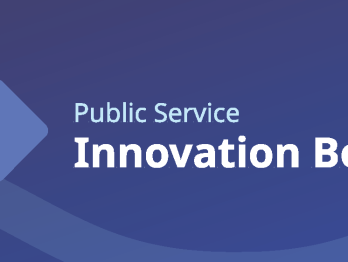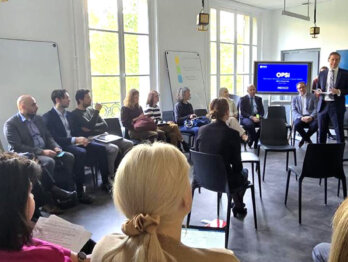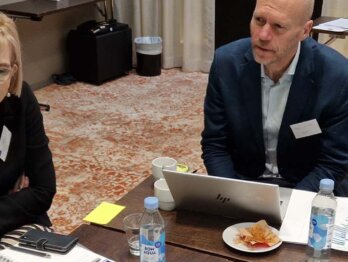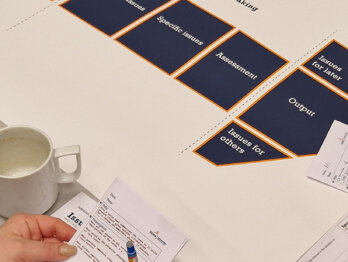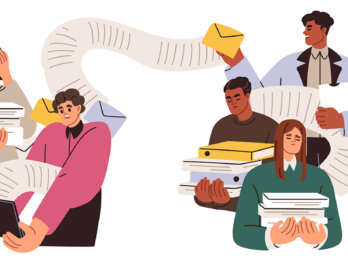Call for Co-Creation Bootcamp: Improving civic participation with emerging technologies
Are you passionate about the potential of emerging technologies for democracy? Do you want to co-create innovative solutions that address real-world challenges in civic participation?
We are looking for developers, designers, researchers, or technologists to join public sector teams to jointly create solutions to civic participation challenges in our co-creation bootcamp in Lisbon from 26 to 27 February 2025. Regardless of your sector – including whether it be academia, a start-up or a civil society organisation – we’re looking for individuals willing to collectively explore on how to address civic participation challenges and make a meaningful impact in Portugal, Spain, and the Netherlands.
The bootcamp will be a safe, collaborative space, structured as a design sprint, and aimed at experimentation. Your technical expertise and experience will be crucial to explore options beyond traditional moulds. We’re aiming to apply innovative ways of thinking to get tangible results, such as paper prototypes, service blueprints, or even a functioning MVP.
Submit your application by 10 January 2025 (23:59 CET).
Selected participants will be offered travel and accommodation for the duration of the bootcamp.
The bootcamp is part of the project “Improving civic participation with emerging technologies”, led by Portugal (AMA/LabX), Spain (INAP), and the Netherlands (Digicampus), funded by the technical support instrument of the European Commission’s DG REFORM, and implemented by the OECD.
Why should you apply?
You can make a difference. Participants have the chance to:
- Address real-life challenges in civic participation. Bring your experience and expertise to create value and pave the way for purpose-led changes.
- Connect and collaborate with government teams from Portugal, Spain and the Netherlands as well as representatives from civil society organisations, start-ups working in tech for participation, and international institutions such as the OECD and the European Commission.
- Raise the visibility of your work in an international setting, with an audience eager to explore and support scalable, impactful tech for participation solutions.
This bootcamp offers a unique platform to showcase your skills, refine your ideas, and contribute to shaping the future of civic participation in Europe.
What challenges will be addressed?
Challenge A: How might we use technology to engage and amplify diverse youth voices in decision-making?
AMA, IPDJ, the Municipality of Cascais, and the Cabinet of the Minister of Youth and Modernisation are exploring ways to enhance the civic participation of young people, especially underrepresented youths. In Portugal, dedicated efforts are underway to engage young people in youth councils, participatory budgets, and community initiatives. However, these initiatives are often limited in their ability to reach young people outside formal institutional networks, with the risk of leaving them vulnerable to disillusionment, potential radicalisation, and a sense of powerlessness in shaping their own futures.
By developing innovative, accessible digital platforms that prioritise inclusivity, transparency, and meaningful engagement, we can transform the ways governments interact with youths and create mechanisms that value diverse voices and experiences. This challenge particularly impacts young people from suburban and rural areas, migrants, ‘youth not in employment, education or training’ (NEETs), and those with health impairments and disabilities. The ambition is to offer a potential breakthrough in rebuilding trust between institutions and the next generation of citizens, and ensuring that decision-making processes account for the full spectrum of community experiences.
The challenge is jointly owned by LabX – the government innovation lab integrated in Portugal’s Administrative Modernization Agency, I.P. (AMA) – IPDJ, the Municipality of Cascais, and the Cabinet of the Minister of Youth and Modernisation.
Challenge B: How might we leverage tech to enable citizens to surface, discuss, and prioritise societal needs?
Identifying societal needs and bringing them to the table of policymakers is a fundamental mechanism of democracy. Through the combination of emerging technologies and participatory processes we can explore how this process could be improved. We can identify how to capture public needs more quickly and with greater depth and translate these into issues to be address through policymaking.
Building on Spain’s civic participation experience, this challenge aims to reduce the gap between citizens and policymakers, calling on innovators to design accessible, secure, and user-friendly solutions that empower citizens across all demographics to voice their concerns and collaborate in shaping policies. Whether through AI-enhanced platforms, hybrid participation models, or other creative approaches, the aim is to make public governance truly participatory.
The challenge is proposed and owned by the General Sub-Directorate for Open Government, under the General Directorate for Public Governance, and INAP’s Laboratory of Public Innovation (LIP), both of which are part of the Spanish Ministry for Digital Transformation and the Civil Service. The Open Government team is responsible for the coordination and monitoring of the Open Government Plan. The LIP is a new laboratory born to support innovation processes in Spanish public administrations by contributing to the valorisation of the technology, talent, and experiential knowledge available in public organisations and in society.
Challenge C: How can policymakers successfully assess vast volumes of qualitative unstructured textual data from public participation procedures, to produce relevant input for decision-making?
Participation professionals often face a trade-off between obtaining in-depth qualitative insights from small groups or quantitative information from large ones. This means a gap may arise for generating meaningful qualitative insights in large scale initiatives. In such cases, policymakers face high costs and significant time demands, often over one month, to analyse data for which they sometimes rely on external consultants. This situation risks disincentivising the organisation of ambitious participation initiatives. Furthermore, it may result in slowed feedback loops between the government and the public, which may undermine trust and inclusivity in participation processes. This challenge affects policymakers, participants, and taxpayers alike, as valuable citizen input is lost or underutilised.
We wish to explore ways to create scalable, flexible AI tools to streamline the analysis of unstructured text capturing the nuances of the public’s opinion, enhance transparency, and strengthen democratic engagement. Therefore, we look for designing and developing contributions for a tool that can analyse large amounts of qualitative data and transform it into coherent summaries that contain arguments and emotions/tone underneath the arguments.
The challenge is submitted by the Knowledge Hub for Participation of the Dutch Ministry of Infrastructure and Water Management. The Hub activates, strengthens, and motivates the development and application of participation knowledge for the participation professional.
Challenge D: How might we lever emerging technologies for citizen engagement that accelerate the transition towards climate-neutral cities?
The global climate crisis demands unprecedented collaboration, and current urban planning processes can be improved in the way they include citizen perspectives, relying on collective intelligence in designing sustainable futures. The Spanish Ministry of Science is exploring how to leverage emerging technologies to address national climate goals and improve participatory processes. The purpose is to further reduce gaps that may appear when integrating citizens’ lived experiences into strategic urban transformation. Existing attempts – such as climate assemblies in Barcelona, participatory budgeting in Valencia, and localised climate action initiatives –demonstrate the potential of current engagement models.
The use of innovative approaches (digital platforms and tools, such as AI, virtual reality, or participatory design methodologies) can help empower diverse citizens to become active co-creators of climate-resilient cities. This challenge directly impacts civil society, municipal staff, technology companies, and academic institutions. The aim is to explore a pathway to participation to support the green transition and ensure climate-neutral, people-centred, and equitable cities by 2050.
The challenge is proposed and owned by the General Secretariat for Innovation of the Ministry of Science, Innovation and Universities of Spain, which is responsible for the implementation of the Government’s policy on scientific and technical research, technological development, and innovation in all sectors.
Challenge E: How might we explore emerging technologies to help young people overcome barriers in accessing the financial benefits they are entitled to?
In the Netherlands, turning 18 marks a significant transition to adulthood, requiring young people to navigate complex processes such as arranging health insurance, applying for student loans, and filing tax returns. These important steps make it possible for youngsters to actively participate in society. However, young people experience barriers in accessing these due to lack of awareness on taking these important steps, complicated government application processes, and fear of stigmatisation or making mistakes. Current government online tools and information aim to inform young people but struggle to fully address all these challenges effectively. As a result, civic participation from youngsters is lacking, which is alarming as civic participation can support the development of providing better public services.
Leveraging technologies to reach and activate young people and guide them through the process of taking these important steps, could help young people in exercising their rights and meeting their obligations. The aim is to simplify access, reduce fear, and provide clear information to ensure that young people are fully supported during this critical life stage, contributing to build their trust in government, and thus enhancing their civic participation into society. To continue improving public services, the government would like confirmation or feedback from youngsters on their experiences.
The challenge is owned by the Department of Public Services of the Ministry of the Interior and Kingdom Relations in the Netherlands. This department aims to make citizen interaction with government services more accessible, efficient and user-friendly, ensuring they are tailored to people’s needs and living environment, and are reliable and self-evident.
Challenge F: How might we enhance digital participation tools like Polis to improve accessibility and reduce affective polarisation?
The Government of the Netherlands’ coalition agreement emphasises the importance of engaging citizens in lawmaking and public debate, especially on complex societal issues like countering disinformation. The Ministry of Interior and the Province of South Holland have been working on the open-source platform Polis to foster inclusive, democratic participation. While Polis offers a valuable mechanism for dialogue, there is a need to modernise the platform to better support diverse and constructive public debate. Current challenges include improving user-centric interfaces for accessibility and inclusivity, as well as expanding AI-driven analysis capabilities, and implementing ethical moderation tools. The goal is to enhance Polis in order to bridge communication gaps between citizens and policymakers, and foster meaningful dialogue that reduces affective polarisation and promotes a resilient democracy.
The challenge is owned by the Dutch Ministry of the Interior and Kingdom Relations and the Province of South Holland, presented by the Polis NL Project, and a team of members from different departments and different expertise, with focuses on democracy, disinformation and open source, usability research, user interface design and digital ethics. Together they are aiming to establish the first structures for the governance of Polis as a (European) digital commons.
How to apply
You can submit your application here. This form takes 12 minutes to fill in.
Application deadline: 10th of January 2025 at 23:59 CET.
Notification date for selected participants: The week of the 20th of January 2025
Want to know more: FAQs
Can I apply if I am not from Portugal, Spain or the Netherlands?
Yes, the call is open to developers based in the European Union. Participants from Portugal, Spain and the Netherlands are particularly encouraged to apply.
Does applying incur a registering fee?
No, applying is free of charge. Moreover, selected developers will have their travel and accommodation expenses covered to participate in the co-creation bootcamp in Lisbon.
Can I apply as a team?
The application is individual, but we are keen getting multiple applications from the same team. In that case, individual applications should be filled and submitted separately.
Do I need to be a developer or strictly a technical person?
No, we’re looking for people that work with technologies, but being able to code is not a prerequisite. Applicants can be designers, product managers, CEOs, researchers – the list goes on. Most important is to bring knowledge and experience from the community of developers, “makers” and designers from the ecosystem of emerging technology for participation.
Should I apply for one specific challenge?
Applications are not targeted to a specific challenge, but rather for joining the bootcamp. However, in the application form, you’ll be asked about your preferred challenge(s). Take this as an opportunity to demonstrate how you can create value. We’ll try our best to match you with that challenge, but you might be invited to join another challenge.
Do I need to have an institutional affiliation or company to apply?
No, the call is open to participants coming from a variety of contexts, including start-ups and other registered businesses, civil society organisations, research groups, informal teams of collaborators, and even individual developers. What truly matters is the value you can bring to the bootcamp. We’re working to make the process as inclusive as possible.
What are the selection criteria?
We aim to have diverse profiles of participants and present at the bootcamp. Applications will be assessed based on (i) the candidate’s motivation to participate, (ii) relevant experience, (iii) contribution that can bring to the co-creation, and (iv) availability and commitment to join the project. The scoring in these four dimensions is going to be balanced with considerations regarding inclusion and diversity.
I have more questions. How can I get in touch?
If you have further questions, do not hesitate to reach out to us at [email protected]. We would be delighted to answer any question you may have regarding this initiative.
This project is funded by the European Union via the Technical Support Instrument, and implemented by the OECD, in cooperation with the European Commission.


